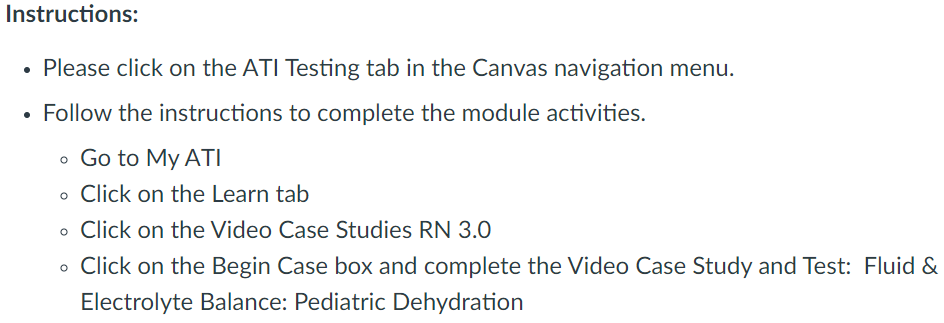NUR105 M1.10: ATI-Video Case Studies: Fluid & Electrolyte Balance: Paediatric Dehydration
Here are the questions and answers related to the ATI-Video Case Studies on paediatric dehydration:
A nurse is assessing a 4-year-old child who has severe dehydration. Which of the following manifestations should the nurse expect?NUR105 M1.10: ATI-Video Case Studies
Answer: The nurse should expect a 10% weight loss. Severe dehydration in a child can result in significant weight loss, which is a key indicator of the severity of the condition.
A nurse is providing discharge teaching about oral rehydration to the parent of a pre-schooler who has dehydration. Which of the following statements by the parent indicate an understanding of the teaching?
Answer: The parent’s statement, “I will offer my child a cup of oral rehydration fluid every time he has diarrhea,” indicates an understanding of the teaching. Offering oral rehydration fluid after each episode of diarrhea is essential to rehydrate the child and replace lost fluids.NUR105 M1.10: ATI-Video Case Studies
A nurse is preparing to obtain a stool specimen for C. diff from a preschool-age child who is wearing diaper briefs because of recent occurrences of diarrhea. Which of the following actions should the nurse take?
Answer: The nurse should place a urinary collection bag on the child before collecting the stool specimen. This is a suitable method to obtain a stool specimen from a child who is wearing diaper briefs. It allows for the collection of the stool without contamination.
A nurse is caring for a pre-schooler who has excoriated skin related to diarrhea. Which of the following actions should the nurse take?NUR105 M1.10: ATI-Video Case Studies
Answer: The nurse should apply a thin layer of zinc oxide to the affected area during each diaper brief change. Zinc oxide can help protect the skin from further damage and promote healing in cases of excoriated skin due to diarrhea.
A nurse is preparing to administer potassium IV to a pre-schooler who has dehydration. Which of the following actions should the nurse plan to take?
Answer: The nurse should ensure the child has voided prior to administration. This is important to ensure that the child’s kidneys are functioning appropriately and can handle the administration of IV potassium.
If you are seeking assistance with ATI testing or online tutoring for nursing, I encourage you to consider our services at FixMyGPA.com. We are here to support your academic and professional goals, providing expert guidance and resources to help you succeed. Don’t hesitate to reach out to us and take the first step towards achieving excellence in your nursing education. Visit our website today for more information.



